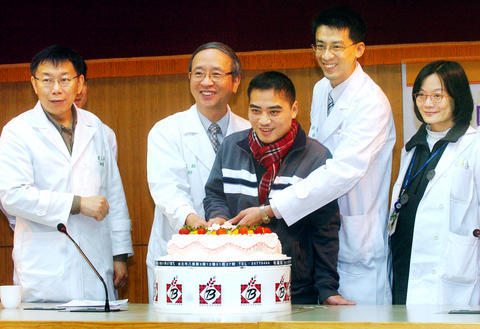Doctors at a local hospital lauded the "miraculous" recovery of a man, who spent a record 117 days on ECMO therapy and will be leaving hospital in time to spend Lunar New Year with his family.
ECMO, or Extracorporeal Membrane Oxygenation, oxygenates blood and removes carbon dioxide from patients whose cardio-pulmonary systems have ceased to function normally.
While the use of ECMOs is relatively common, what made the case unusual was the fact that the patient was kept alive by the system -- usually reserved for short-term life-support measured in days -- for almost four months, doctors at National Taiwan University Hospital (NTUH) said.

PHOTO: CHEN TSE-MING, TAIPEI TIMES
After nearly drowning on July 22 last year, the 26-year-old man surnamed Hu (
"You can see on the X-rays that both sides of his lungs had turned opaque, which means they were permeated with water," said Tsai Keh-sung (
Hu's lung almost completely ceased to function at one point, making it necessary for him to be hooked up to two ECMO machines at the same time.
"The fact that he recovered is something of a miracle," said Lee Yung-chie (
Wang Chih-hsien (王植賢), one of the specialists who tended to Hu, said he estimated the hospital incurred costs of NT$2.5 million on Hu's care in the first month alone.
"The first month is the most expensive as he had to be hooked up to two ECMOs," he said.
The use of ECMOs is covered by the National Health Insurance (NHI), but hospital doctors said that reimbursement by the NHI have to be approved on a case-by-case basis.
"In around 11 percent of cases, reimbursement is denied," said Ko Wen-che (
In such cases the hospital is required to absorb the cost rather than passing it on to the patients.
Although ECMO has been in use for 14 years, the treatment has come under the spotlight in recent years. Many patients' families now request ECMO treatment by name when their loved ones are in critical condition, while others have criticized hospitals for overusing the expensive treatment on unsuitable candidates.
"Deciding whether to treat a patient with ECMO is an agonizing choice," Ko said.
"It's even harder to decide when to turn the ECMO off," Ko said.
About 150 patients were put on ECMO therapy last year at NTUH, more than any other hospital in the world. Sixty survived, a success rate of just 40 percent.
"But without the ECMO, every one of those 60 people would be dead," Ko said.

Palauan President Surangel Whipps Jr arrived in Taiwan last night to kick off his first visit to the country since beginning his second term earlier this year. After arriving at Taoyuan International Airport at around 6:30 pm, Whipps and his delegation were welcomed by Minister of Foreign Affairs Lin Chia-lung (林佳龍). Speaking to gathered media, the Palauan leader said he was excited and honored to be back in Taiwan on his first state visit to Taiwan since he was sworn in this January. Among those traveling with Whipps is Minister of State Gustav N. Aitaro, Public Infrastructure

President William Lai (賴清德) yesterday thanked Palau for its continued support of Taiwan's international participation, as Taipei was once again excluded from the World Health Assembly (WHA) currently taking place in Switzerland. "Palau has never stopped voicing support for Taiwan" in the UN General Assembly, the WHO and other UN-affiliated agencies, Lai said during a bilateral meeting with visiting Palau President Surangel Whipps Jr. "We have been profoundly touched by these endorsements," Lai said, praising the Pacific island nation's firm support as "courageous." Lai's remarks came as Taiwan was excluded for the ninth consecutive year from the WHA, which is being held in

RESOLUTIONS DEBATE: Taiwan’s allies said that UN and WHA resolutions cited by China and other nations ‘do not determine Taiwan’s participation in WHO activities’ A proposal to invite Taiwan to this year’s World Health Assembly (WHA) was rejected on Monday, resulting in Taipei’s absence from the annual meeting for a ninth consecutive year, although partners spoke up for Taiwan’s participation at the first day of the meeting. The first agenda item after the opening was a “two-on-two debate” on a proposal to invite Taiwan to participate at the WHA as an observer. Similar to previous years, two countries made statements in favor of the proposal, while two others expressed their opposition. Philippine Secretary of Health Teodoro Herbosa, president of the 78th WHA, accepted the WHA General Committee’s

At least three people died and more than a dozen were injured yesterday afternoon when a vehicle struck a group of pedestrians in New Taipei City’s Sansia District (三峽). The incident happened at about 4pm when a car rammed into pedestrians at an intersection near Bei Da Elementary School. Witnesses said the sedan, being driven at a high speed, ran a red light, knocking scooters out of the way and hitting students crossing the road before careening into a median near the intersection of Guocheng and Guoguang streets. The incident resulted in three deaths and 13 injuries, including the driver, a 78-year-old man